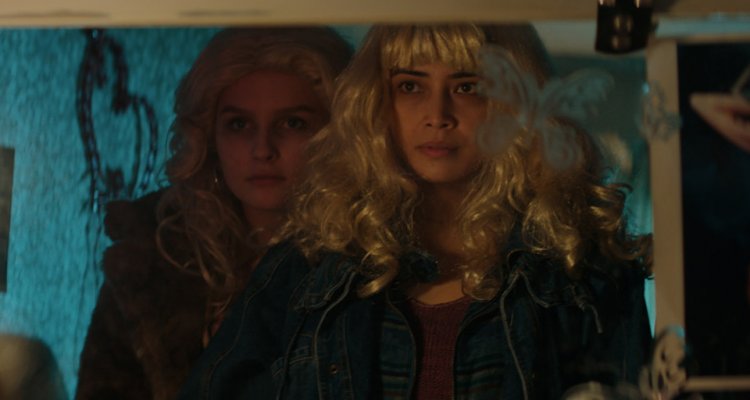Director Sonejuhi Sinha’s fascinating feature debut, “Stray Dolls,” is a purposefully imperfect look at what leads promising young women to turn to a life of crime, thanks to a country that likes the chest-bump the word “opportunity” a whole bunch, without providing more than half the population their fair share of it. Capturing the descent through a journey of innate darkness and lustful catharsis, the seedy, almost B-movie-like art-house picture may be flawed, but it’s an impassioned examination of close female relationships and immigration issues, exploring how the strength and intimacy of such bonds often stem from shared adversity, not superficial traits or shopping habits.
A bright red, neon “Vacancy” sign lights the lobby of the Tides Plaza Motel. Riz (Geetanjali Thapa) isn’t looking to purchase a room for a night, she’s looking for a job, having recently made her way into upstate New York from India, after getting herself a passport with the help of some homeland gang connections. We’ll get you “an American one,” her new boss, Una (Cynthia Nixon), the motel’s matriarch, tells her, shadily refusing to hand Riz’s passport back, before shredding it in private. After Una shows Riz to the room she’ll be staying in under her employ, another woman, named Dallas (Olivia DeJonge) barges in, irked to find someone sleeping in her bed, asking if Riz “is Mexican or something?”
Between how the film is shot and characters the audience are immediately introduced to, one can practically see the sad desperation, the longing to escape to a different life oozing out of the setting; you can feel the dust beneath your nose in each room, smell the carpet stains and old weed residue. After Dallas walks in on Riz, she holds her new roommate at knifepoint, having grown accustomed to the motel’s, kill or be killed, eat or be eaten, survival mentality, stealing some of Riz’s personal belongings. If she wants to earn them back, she’ll help Dallas steal from Una’s patrons.
When Riz swipes a brick of blow off a resident drug dealer, Sal (Samrat Chakbarati), who tries to buy sexual favors from her upon realizing they share the same ethnic background, it sets off a dramatic chain of events. Desperate to find new ways to make more fast cash, in order to start a new life, the two young women soon realize they’ve gotten in way over their heads when a grim-looking fellow in a cowboy hat turns up at the front desk asking Una for Sal’s room.
While “Stray Dolls” does often seem like its fighting against creative constraints (it’s a good thing the shadowy style fits the story so well because some scenes definitely teeter on being underlit), it has blips of artistic greatness, including a few impressively naturalistic long takes that aren’t screaming, “Hey, look at me!” but actually heighten clearly considered cinematic qualities. A couple of drone shots come out of nowhere—a jarring shift from the film’s deliberately shoddy, shaky-cam style—but, for the most part, the visuals do a very consistent job evoking sensory feeling through economic staging – the discovery of psychotropic bliss, but also the putrid sting of poor choices catching up with you. If only the script was as strong as the filmmaking.
After being set-up as a serious plot obstacle, Sal disappears from the flick following the inciting incident, and when he suddenly returns, the conflict immediately explodes. It also has an unfortunately stereotypical cold open, one that uses a frantic in medias res intro as a cheap means of creating instant tension— it has almost no bearing on the overall narrative outside promising where the movie will go. The second act of the film also drags until arriving at the centerpiece scene, kicking into high gear around the third act, and the character of Una comes off as over-written yet under-utilized.
While this film is far from perfect, “Stray Dolls” feels like a mesh between “The Florida Project” and “Spring Breakers,” with a few shades of “Blood Simple” thrown in. Despite being somewhat hindered by a lack of resources, the film stands out as bold, original take on the kind of material that would fall flat and feel derivative without such a firm voice behind the work—a voice that is unfortunately rare in this genre. Sinha’s debut may not be destined to be the next American indie classic, but it’s a powerful debut film with a stirring perspective on criminality and immigration. [B]

